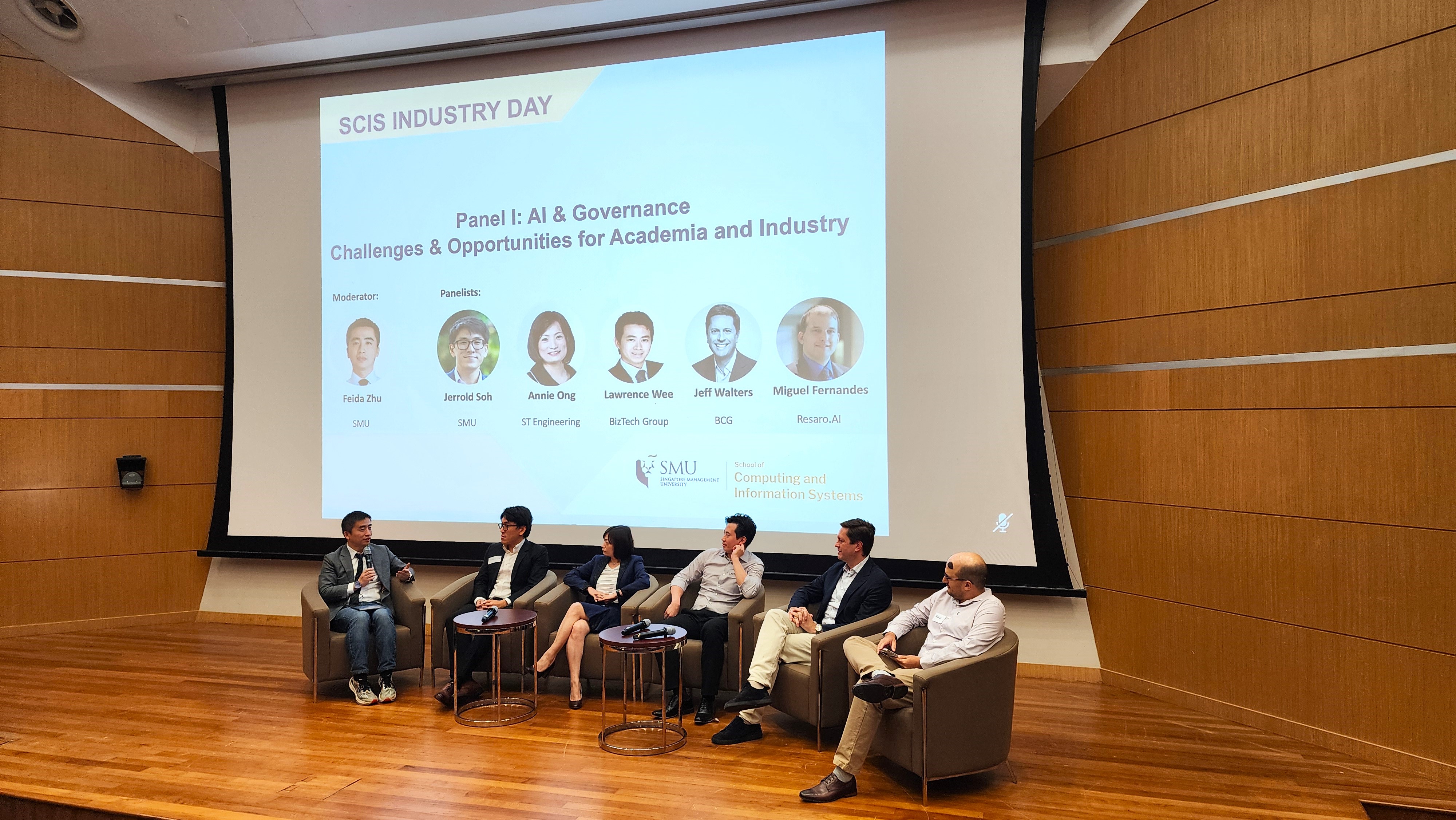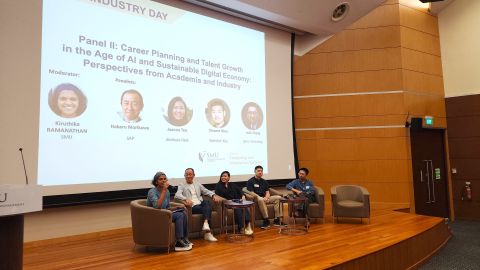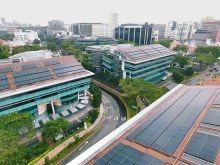Sparking connections between industry and academia

On 30 September 2024, SMU School of Computing and Information Systems (SCIS) held its inaugural SCIS Industry Day.
The event aimed to promote bilateral dialogue between industry and academia on the opportunities and challenges at the frontiers of technology. A total of around 150 industry professionals registered for the full-day programme of talks, panels, networking, and break-out sessions.
In his opening remarks, SCIS Dean Professor Hwee Hwa Pang shared how SCIS continuously reaches out to like-minded partners.
“As a school, we can’t create the practical impact that we want by working on our own, and we engage with partners in both government agencies and companies quite extensively,” said Professor Pang.
“We hope that through continuous dialogue with industry and academia, we can leverage our research expertise to create good solutions for social impact.”
He also highlighted the distinguished faculty at SCIS, which includes several professors recognised as top scientists globally according to CSRankings, a metrics-based ranking of leading Computer Science (CS) institutions that evaluates academics based on their publications at top research conferences. In the most recent rankings for 2023, SMU jumped to second place, up two places from 2022’s rankings.
Following the opening remarks, SCIS Vice Provost (Research) Archan Misra touched on the work done by SCIS. “Part of our job is to work with different SMU schools and identify peaks of research competencies across schools,” he explained.
In line with SMU’s mission to connect academic research with practical applications, he added, SCIS researchers collaborate closely with industry partners and public agencies, with a strong emphasis on delivering value to the Southeast Asia region. He also highlighted SCIS’ research in areas such as last-mile logistics optimisation, intelligence software systems and security, human-AI synergy for human robot co-working, AI and Web 3.0 technologies and governance, and AI-augmented decision-making for businesses and urban operations.
Opportunities and challenges of AI
The sessions commenced with the first panel discussion titled “AI & Governance: Challenges and Opportunities for Academia and Industry”.
Panellists included Professor Jerrold Soh, Assistant Professor at SMU Yong Pung How School of Law, and deputy director of the Centre for Computational Law at SMU; Ms Annie Ong, general manager of Sales at ST Engineering; Mr Lawrence Wee, director for Business and Ecosystems, BizTech Group; Mr Jeff Walters, managing director and senior partner at Boston Consulting Group; and Miguel Fernandes, technical partner at AI Verification, Resaro.AI.
Panel moderator Professor Feida Zhu, Associate Professor of Computer Science at SCIS started the session with the question of how AI could improve efficiency and accuracy in industries, as well as the challenges with regards to governance to regulate this increased reliance on the technology.
In critical industries like healthcare, AI technology has been in use, even before the current explosion in growth that followed the release of generative AI like ChatGPT.
“[The healthcare industry] are actually using AI to analyse a very large amount of patient data so that they can produce a better and more accurate prediction for diagnosis and treatment recommendation,” explained Ms Ong, sharing her experience from working closely with the healthcare industry.
Ms Ong went on to emphasise that at the end of the day, recommendations made by AI systems are strictly that – recommendations. “It’s not a final outcome that will actually be adopted. Someone should still be in the loop to ensure that the entire process complies with medical standards and ensure safety before it is distributed to the patient.”
This point was reiterated throughout the panel discussion—the necessity of human involvement in the process to identify issues such as biases in algorithms, despite the potential benefits AI offers in handling large datasets or performing routine tasks. The consensus among the panellists was that many of the challenges lie in the evolving governance frameworks required to manage AI technologies. These frameworks must address both the accountability of AI systems and key areas such as data privacy protection. Universities thus have a pivotal role in shaping the mindset of future leaders in the AI ecosystem, they noted.
The impact of AI and technology on jobs
The second panel focused on the impact of AI on careers and talent development.
Titled “Career Planning and Talent Growth in the Age of AI and Sustainable Digital Economy: Perspectives from Academia and Industry”, the session was moderated by Dr Kiruthika Ramanathan, director of SMU’s Master of IT in Business (Digital Transformation) Programme.

Speaking on the panel was Ms Joanna Teo, founder of Attribute Data; Mr Vincent Niou, founder of Skeleton Key; Mr Hakaru Morikawa, head of customer advisory, SAP Southeast Asia; and Mr Josh Zhang, managing director of Syrius Technology Singapore.
Addressing how to stay relevant in a time when AI is transforming the way we work, the panel discussion emphasised transferable skillsets. With tech causing disruptions across different industries and job roles, it is key for staying in business to be able to change one’s mindset, separating your career from your job title.
“Learn to be resourceful and pick up adjacent skills that are related to what you’re doing – don’t just do your job description. See the trends and you can plan your trajectory,” urged Mr Niou.
This ethos of continuous learning and skill acquisition beyond one’s job description was echoed throughout the panel discussion, highlighting the significant role managers and educational institutions play in fostering a culture of lifelong learning.


